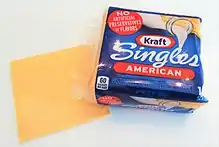Kraft Singles
Kraft Singles is an American brand of processed cheese product that is manufactured and sold by Kraft Foods, introduced in 1949.[1] Kraft individually wrapped "slices" are not really slices off a block, but formed separately in manufacturing.[2] Kraft singles do however contain ingredients in common with cheddar cheese (pasteurized milk, cheese culture, salt, enzyme(s), annatto vegetable color) as evidenced in the ingredients list below, from the Kraft website. Those ingredients are: milk, whey, milk protein concentrate, milkfat, sodium citrate, contains less than 2% of calcium phosphate, whey protein concentrate, salt, lactic acid, sorbic acid as a preservative, cheese culture, annatto and paprika extract (color), enzymes, vitamin d3. Contains: milk.[3]
 A package of Kraft Singles along with an individual slice. | |
| Product type | Processed cheese |
|---|---|
| Owner | Kraft Heinz |
| Country | United States |
| Introduced | 1949 |
| Markets | Worldwide |
| Website | http://www.kraftrecipes.com/kraftcheese/kraft-singles.aspx |
In the US, Kraft Singles is manufactured in regular, 2% Milk, and Fat Free. In Australia, a short-lived product called Vegemite Singles combined Kraft Singles and Vegemite.
Kraft singles do not qualify for the US FDA Pasteurized Processed Cheese[4] labeling. For this reason Kraft labels them Pasteurized Prepared Cheese Product to avoid FDA sanctions. They were calling Kraft Singles Pasteurized Prepared Cheese Food until the FDA gave them a warning in December 2002 that the product could not be legally labeled as "Pasteurized Processed Cheese Food" due to the inclusion of milk protein concentrates. Kraft complied with the FDA order by changing the label to the current Pasteurized Prepared Cheese Product.[5]
One of the more famous ad campaigns involved the claim that each ¾ ounce slice contained "five ounces of milk",[6] which makes them taste better than imitation cheese slices made mostly with vegetable oil and water and hardly any milk. The campaign was lambasted for its implications that each slice contained the same amount of calcium as a five-ounce glass of milk and also more calcium than imitation cheese slices, which eventually led to a ruling by the Federal Trade Commission in 1992 that ordered Kraft to stop making false claims in its advertising.
In Australia, the Kraft branding was retired in 2017. Kraft's successor company in Australia, Mondelez, sold their cheese products line to Bega Cheese, but retained rights to the Kraft name. Bega switched the name of their sliced cheese product from "Kraft Singles" to "Dairylea Slices", as Bega acquired the rights to the Dairylea brand in Australia in the deal. The "Kraft Singles" name could return in the future, as Kraft Heinz will assume the trademark from Mondelez at the beginning of 2018.[7]
In America, consumers are slowly moving away from Kraft Singles, though around 40 percent of households in America continue to buy Kraft Singles, sales are flat.[8]
References
- "1950 LIFE Magazine Ad". LIFE Magazine. 1950-09-04. Retrieved 2011-05-04.
- "Who Made That Kraft Single?". The New York Times. 3 June 2012.
- "Landing".
- "CFR - Code of Federal Regulations Title 21".
- "Kraft Foods North America, Inc. 18-Dec-02". 10 January 2011. Archived from the original on 10 January 2011.CS1 maint: bot: original URL status unknown (link)
- Jen Wolford (5 February 2008). "1980s 1987 Kraft Singles Commercial" – via YouTube.
- "Kraft, one of the world's biggest food brands, to be phased out in Australia and New Zealand". news.com.au. 26 May 2017.
- Telford, Taylor (February 22, 2019). "Kraft's iconic American cheese is losing ground in today's America". Washington Post. Retrieved February 22, 2019.